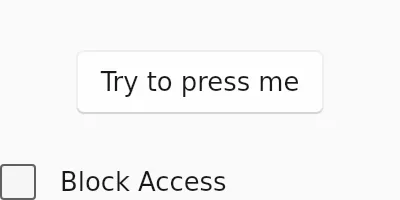TouchArea
Use TouchArea to control what happens when the region it covers is touched or interacted with
using the mouse.
When not part of a layout, its width or height default to 100% of the parent element.
export component Example inherits Window { width: 200px; height: 100px; area := TouchArea { width: parent.width; height: parent.height; clicked => { rect2.background = #ff0; } } Rectangle { x:0; width: parent.width / 2; height: parent.height; background: area.pressed ? blue: red; } rect2 := Rectangle { x: parent.width / 2; width: parent.width / 2; height: parent.height; }}Properties
Section titled “Properties”enabled
Section titled “enabled” bool default: true
When disabled, the TouchArea doesn’t recognize any touch or mouse events and they are
passed through to elements underneath.
has-hover
Section titled “has-hover” bool (out) default: false
Set to true when the mouse is over the TouchArea area.
mouse-cursor
Section titled “mouse-cursor” enum MouseCursor default: the first enum value
MouseCursor
This enum represents different types of mouse cursors. It’s a subset of the mouse cursors available in CSS. For details and pictograms see the MDN Documentation for cursor ↗. Depending on the backend and used OS unidirectional resize cursors may be replaced with bidirectional ones.
default: The systems default cursor.none: No cursor is displayed.help: A cursor indicating help information.pointer: A pointing hand indicating a link.progress: The program is busy but can still be interacted with.wait: The program is busy.crosshair: A crosshair.text: A cursor indicating selectable text.alias: An alias or shortcut is being created.copy: A copy is being created.move: Something is to be moved.no-drop: Something can’t be dropped here.not-allowed: An action isn’t allowedgrab: Something is grabbable.grabbing: Something is being grabbed.col-resize: Indicating that a column is resizable horizontally.row-resize: Indicating that a row is resizable vertically.n-resize: Unidirectional resize north.e-resize: Unidirectional resize east.s-resize: Unidirectional resize south.w-resize: Unidirectional resize west.ne-resize: Unidirectional resize north-east.nw-resize: Unidirectional resize north-west.se-resize: Unidirectional resize south-east.sw-resize: Unidirectional resize south-west.ew-resize: Bidirectional resize east-west.ns-resize: Bidirectional resize north-south.nesw-resize: Bidirectional resize north-east-south-west.nwse-resize: Bidirectional resize north-west-south-east.
The mouse cursor type when the mouse is hovering the TouchArea.
mouse-x
Section titled “mouse-x” length (out) default: 0px
Set by the TouchArea to the position of the mouse within it.
mouse-y
Section titled “mouse-y” length (out) default: 0px
Set by the TouchArea to the position of the mouse within it.
pressed-x
Section titled “pressed-x” length (out) default: 0px
Set by the TouchArea to the position of the mouse at the moment it was last pressed.
pressed-y
Section titled “pressed-y” length (out) default: 0px
Set by the TouchArea to the position of the mouse at the moment it was last pressed.
pressed
Section titled “pressed” bool (out) default: false
Set to true by the TouchArea when the mouse is pressed over it.
Callbacks
Section titled “Callbacks”clicked()
Section titled “clicked()”Invoked when clicked: A finger or the left mouse button is pressed, then released on this element.
double-clicked()
Section titled “double-clicked()”Invoked when double-clicked. The left mouse button is pressed and released twice on this element in a short
period of time, or the same is done with a finger. The clicked() callbacks will be triggered before the double-clicked() callback is triggered.
moved()
Section titled “moved()”The mouse or finger has been moved. This will only be called if the mouse is also pressed or the finger continues to touch the display. See also pointer-event(PointerEvent).
pointer-event(PointerEvent)
Section titled “pointer-event(PointerEvent)”PointerEvent
Represents a Pointer event sent by the windowing system.
This structure is passed to the pointer-event callback of the TouchArea element.
button(PointerEventButton): The button that was pressed or releasedkind(PointerEventKind): The kind of the eventmodifiers(KeyboardModifiers): The keyboard modifiers pressed during the event
scroll-event(PointerScrollEvent) -> EventResult
Section titled “scroll-event(PointerScrollEvent) -> EventResult”Invoked when the mouse wheel was rotated or another scroll gesture was made.
The PointerScrollEvent argument contains information about how much to scroll in what direction.
PointerScrollEvent
Represents a Pointer scroll (or wheel) event sent by the windowing system.
This structure is passed to the scroll-event callback of the TouchArea element.
delta_x(length): The amount of pixel in the horizontal directiondelta_y(length): The amount of pixel in the vertical directionmodifiers(KeyboardModifiers): The keyboard modifiers pressed during the event
The returned EventResultindicates whether to accept or ignore the event. Ignored events are
forwarded to the parent element.
EventResult
This enum describes whether an event was rejected or accepted by an event handler.
reject: The event is rejected by this event handler and may then be handled by the parent itemaccept: The event is accepted and won’t be processed further
© 2025 SixtyFPS GmbH
